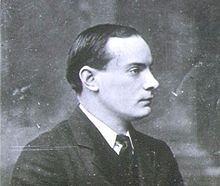Padraig Pearse
| Padraig Henry Pearse Pádraig Anraí Mac Piarais |
|
|---|---|
 |
|
| Born |
10 November 1879 Dublin, Ireland |
| Died | 4 May 1916 (aged 36) Kilmainham Gaol, Dublin, Ireland |
| Allegiance |
Irish Republican Brotherhood Irish Volunteers |
| Years of service | 1913–1916 |
| Rank | Commander-in-chief |
| Battles/wars | Easter Rising |
| Other work | Educator, principal, barrister, republican activist, poet |
Patrick Henry Pearse (also known as Pádraic or Pádraig Pearse; Irish: Pádraig Anraí Mac Piarais; An Piarsach; 10 November 1879 – 3 May 1916) was an Irish teacher, barrister, poet, writer, nationalist and political activist who was one of the leaders of the Easter Rising in 1916. Following his execution along with fifteen others, Pearse came to be seen by many as the embodiment of the rebellion.
Pearse and his brother Willie and sisters Margaret and Mary Brigid were born at 27 Great Brunswick Street, Dublin, the street that is named after them today. It was here that their father, James Pearse, established a stonemasonry business in the 1850s, a business which flourished and provided the Pearses with a comfortable middle-class upbringing. Pearse's father was a mason and monumental sculptor, and originally a Unitarian from Birmingham in England.
Pearse grew up surrounded by books. His father had had very little formal education, but was self-educated; he had two children Emily and James, from his first marriage (two other children died in infancy). His second wife, Margaret Brady, was from Dublin, and her father's family from County Meath were native Irish speakers. The Irish-speaking influence of Pearse's great-aunt Margaret, together with his schooling at the CBS Westland Row, instilled in him an early love for the Irish language.
Pearse soon became involved in the Gaelic revival. In 1896, at the age of 16, he joined the Gaelic League (Conradh na Gaeilge), and in 1903, at the age of 23, he became editor of its newspaper An Claidheamh Soluis ("The Sword of Light").
Pearse's early heroes were ancient Gaelic folk heroes such as Cúchulainn, though in his 30s he began to take a strong interest in the leaders of past republican movements, such as the United Irishmen Theobald Wolfe Tone and Robert Emmet. Both had been Protestant, but it was from such men as these that the fervently Catholic Pearse drew inspiration for the rebellion of 1916.
...
Wikipedia
